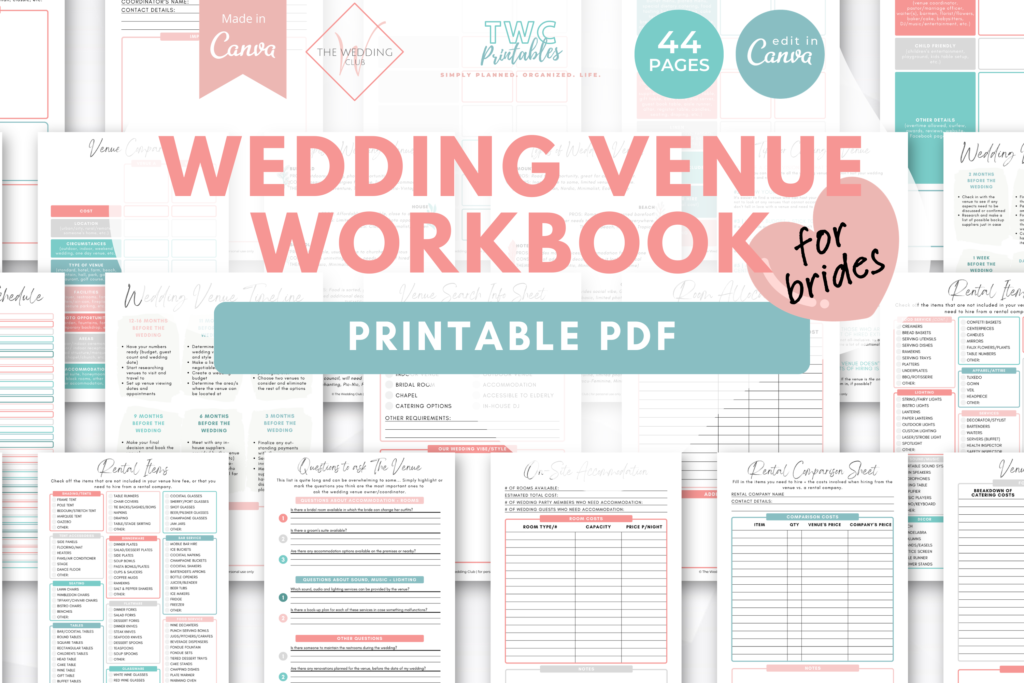Planning your dream wedding is such an exciting adventure, but let’s be real—it can also get a bit crazy sometimes.
We totally get it!
That’s why we’ve put together this blog post with all the insider tips to help you handle the 13 most common stressors during wedding planning like total pros.
From juggling budgets to managing guest lists, we’ve got your back!

Wedding Planning Made Easy: How to Handle the Stress and Savor the Moments
Picture this: you and your partner standing hand in hand, surrounded by the love and support of your closest friends and family, as you say “I do” and embark on a beautiful journey together.
Your wedding day is undoubtedly a day filled with joy and celebration, but getting there can sometimes feel like a whirlwind of decisions, deadlines, and dilemmas.
It’s important to acknowledge and address these stressors in order to have a happy and successful wedding planning process. Let’s discuss some common wedding stressors and provide tips and strategies for managing them.
The most common stressors during wedding planning
-
Financial stress: Wedding planning can be expensive, and many couples may feel stressed about staying within their budget and making sure they have enough money for everything.
-
Time constraints: Wedding planning can be time-consuming and demanding. It’s common for brides and grooms to feel stressed about managing their time effectively and balancing wedding planning with work, school, and personal life.
-
Decision-making: There are many decisions that need to be made when planning a wedding. Brides and grooms may feel stressed trying to decide on things like the venue, the dress, the menu, and the guest list.
-
Pressure from family and friends: Brides and grooms may feel pressure from family and friends to make certain choices about their wedding, which can add to the stress of planning.
-
Difficulty in choosing the right wedding vendors: Finding the right vendors can be difficult, from florists, photographers, caterers, musicians, etc. Brides and grooms may feel stressed trying to find the right vendors that fit their needs and budget.
-
Unforeseen problems and setbacks: Sometimes things don’t go as planned, and unexpected problems or setbacks can arise. This can cause additional stress for the couple.
-
Relationship stress: Wedding planning can put a lot of pressure on a couple’s relationship. Brides and grooms may feel stressed trying to balance wedding planning with maintaining a healthy relationship with their partner.
-
Difficulty in delegating wedding tasks: Many brides and grooms may find it difficult to delegate tasks to others, which can lead to feeling overwhelmed and stressed.
-
Pressure to have a perfect wedding: With the rise of social media, there is a lot of pressure to have a perfect wedding. Brides and grooms may feel stressed trying to live up to unrealistic expectations.
-
Concerns about the future: The wedding is an important step in a couple’s future together, and it’s common for brides and grooms to feel stressed about what the future holds.
-
Guest list management: It can be difficult to decide on the guest list and please everyone. Brides and grooms may feel stressed trying to decide who to invite, who to leave off the list, and how to handle any conflicts that may arise.
-
Weather concerns: Outdoor weddings can be affected by the weather, and brides and grooms may feel stressed about the possibility of rain or other inclement weather on their big day.
-
DIY projects and crafting: Some brides and grooms may choose to do some of their wedding decorations, favors, or other items by themselves. This can be a fun and cost-effective option, but it can also add extra stress to the wedding planning process if the couple is not experienced or skilled in DIY projects and crafting.
Let’s have a look at each one of these and how you can navigate them to make your wedding planning process so much easier!
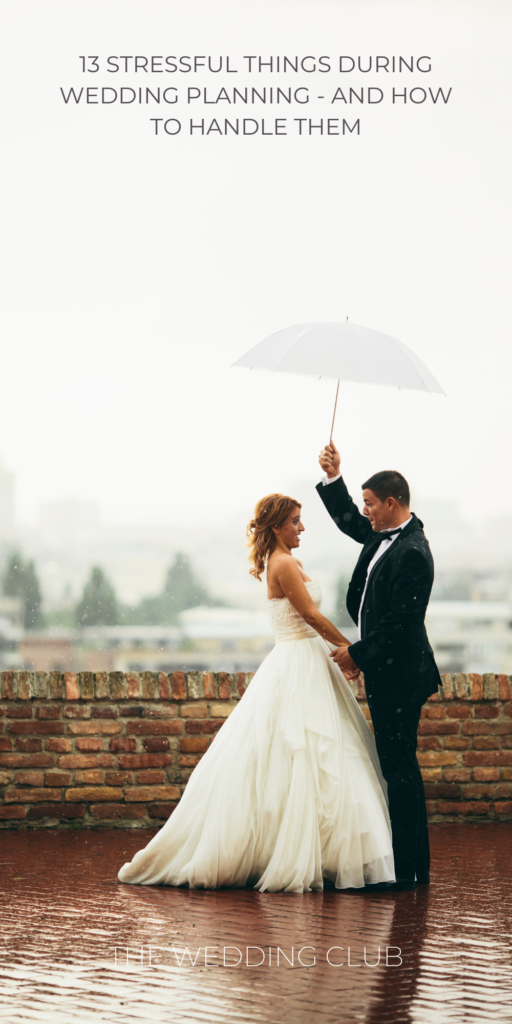
1. Financial Stress
Alright, let’s get real for a moment—financial stress and wedding planning often go hand in hand. I mean, who knew throwing a party could be so expensive, right?
From venues to flowers and that stunning dress you’ve been eyeing, it feels like money is flying out the window faster than you can say “I do.
It’s totally natural to feel overwhelmed and anxious about the costs piling up. But hey, take a deep breath! Remember, you’re not alone in this. So many couples have been right where you are. The key is finding that sweet spot between your dream wedding and what your budget can handle.
With some smart money management and maybe a few creative hacks, you’ll be surprised at how you can make your special day unforgettable without breaking the bank. Trust us, it’s all about the love and laughter, not the zeros on the price tag!
Here are some tips for handling your financial stress:
Set a budget and stick to it: Determine how much you can afford to spend on your wedding, and create a realistic budget based on that amount. Be sure to factor in all costs, including those that may be overlooked, such as tips and taxes. Once you have a budget, try to stick to it as closely as possible.
Make a list of priorities and allocate funds accordingly: Make a list of what is most important to you and your partner, and allocate your funds accordingly. For example, if having a beautiful wedding dress is a priority, allocate more funds to that category.
Be mindful of hidden costs and unexpected expenses: Weddings can have many hidden costs, such as taxes and gratuities, so be sure to factor these in when creating your budget. Also, be prepared for unexpected expenses that may come up during the planning process. It’s best to have a contingency fund in place for these costs.
Be creative and consider alternative options: Instead of having a traditional, large wedding, consider alternative options, such as a smaller or less formal ceremony or reception, which can often be less expensive.
Use online wedding planning tools: There are many online tools available to help you plan your wedding, from budget trackers to guest lists. These can be a great way to stay organized and on top of expenses.
Ask for financial help from family members: If you’re struggling to afford your wedding, consider asking for financial help from family members.
Look into financing options: If you’re unable to cover the cost of your wedding with savings or help from family members, consider looking into financing options, such as personal loans. Be sure to read the terms and conditions carefully and compare rates from different lenders, and set this is a possible “plan Z” or last resort.
Have open and honest communication with your partner and any other financial contributors: It’s important to have open and honest communication with your partner and any other financial contributors to make sure everyone is on the same page and aware of the expenses. This will help avoid any disagreements or misunderstandings.
Pro Tip: When it comes to wedding finances, it’s best to have a very comprehensive budget in place – from an overview to a breakdown of costs and a list of hidden expenses – that’s why we’ve included an epic one in the wedding planner templates for Canva.

2. Time Constraints
Time constraints can feel like the ultimate wedding planning nemesis, leaving couples wondering how on earth they’ll get everything done in time for the big day. With to-do lists that seem to multiply by the minute, it’s easy to feel like you’re running against the clock.
From booking the perfect venue to finalizing the guest list, each decision carries a sense of urgency. Finding vendors, selecting the right dress, and coordinating with the bridal party—all while juggling work, family, and life in general—can leave you feeling like there are not enough hours in the day.
But hey, take a deep breath! Time constraints may be a challenge, but they’re not unbeatable. With some savvy planning, smart prioritizing, and maybe a touch of delegation, you’ll be surprised at how you can stay on track and create the wedding of your dreams without losing your sanity.
Here are some tips for handling time constraints when it comes to planning a wedding:
- Create a detailed checklist and set deadlines for each task.
- Prioritize tasks based on their level of importance.
- Be flexible and willing to adjust the plans if necessary.
- Hire a wedding planner or coordinator to help manage the time constraints.
- Set up regular meetings with vendors and keep open communication with all parties involved in the planning process.
- Start planning well in advance to ensure that you have enough time to complete all tasks.
- Be mindful of how much time each task will take and plan accordingly.
- Be realistic with the time you have and don’t take on more than you can handle.
- Consider hiring a day-of coordinator to handle any last-minute details on the wedding day.
- Take time to enjoy the planning process and don’t let it stress you out.
Pro Tip: The best way to handle any time constraints and due dates when planning a wedding is by having a timeline in place. You need to work out how much time you have left before your big day and then divide what needs to be done into categories, degrees of urgency, and when it should be due before the day. We have included some pre-filled timelines for various durations before your wedding day (from 16 months out right down to 3 months) in the wedding planner templates for Canva.

3. Decision-making
Decisions, decisions, decisions—welcome to the whirlwind of wedding planning! From choosing the perfect venue to selecting the color palette and everything in between, it feels like the never-ending game of “What’s Your Choice?”
Stress levels can skyrocket as you try to navigate through countless options, each one vying for your attention. And let’s be honest, the fear of making the wrong decision can feel paralyzing.
But guess what? It’s all part of the journey! Take a deep breath and remember that this is your special day, and your choices are a reflection of your unique love story.
Embrace the process, trust your instincts, and remember that there’s no such thing as a “perfect” decision. With a little bit of courage and a lot of heart, you’ll create a wedding that’s authentically you.
Here are some tips for making decisions for your wedding:
Set priorities: Determine what elements of the wedding are most important to you and your partner, and make those a priority when making decisions.
Communicate: Openly discuss your priorities, expectations, and concerns with your partner, and make sure you are on the same page.
Gather information: Research different vendors, venues, and wedding services to make informed decisions.
Consult with others: Seek input and advice from friends, family, and wedding professionals, but remember that ultimately the decision should be yours.
Compare options: Compare the pros and cons of different options, and weigh them against your priorities and budget.
Trust your gut: Trust your instincts and go with what feels right for you and your partner.
Be willing to compromise: Weddings can be a compromise between two families, be willing to listen to everyone’s ideas and try to come to a compromise.
Remember the bigger picture: Keep in mind that the wedding is just one day, the most important thing is the marriage and the lifetime commitment that comes after the wedding.
4. Pressure from family and friends
As if finding the perfect venue and nailing down the guest list wasn’t enough, there’s often an extra challenge: navigating the opinions and expectations of family and friends.
We get it—everyone wants to be involved and offer their two cents, but sometimes it can feel like you’re suffocating under a pile of well-meaning advice. From your mom insisting on a certain theme to your best friend pushing for a particular vendor, handling pressure from loved ones can be tough.
Remember: This is YOUR wedding, and it’s okay to set boundaries and stay true to your vision. Your family and friends love you and want the best for you, but that doesn’t mean you have to sacrifice your dreams for theirs.
It’s all about finding that delicate balance between being open to suggestions and asserting your own desires. So stay strong, communicate openly, and keep the focus on what truly matters: celebrating your love and creating memories that will last a lifetime.
Here are a few tips for handling pressure from family and friends during wedding planning:
Communicate your vision and preferences clearly. Make sure your family and friends understand what you want for your wedding, and explain why certain decisions are important to you.
Set boundaries and stick to them. It’s important to be assertive and let people know what you are and are not comfortable with.
Be open to compromise. While it’s important to stay true to your vision, be open to suggestions and compromises where possible.
Seek the help of a wedding planner. A professional planner can help you navigate the planning process and deal with any conflicts that may arise.
Remind yourself that it is your day and you should be happy with the way things are.
Take breaks when you need it. Planning a wedding can be overwhelming, so make sure to take time for yourself to relax and recharge.
Lastly, try to focus on what is important and don’t sweat the small stuff. Remember that the most important thing is that you and your partner are getting married and starting your life together.
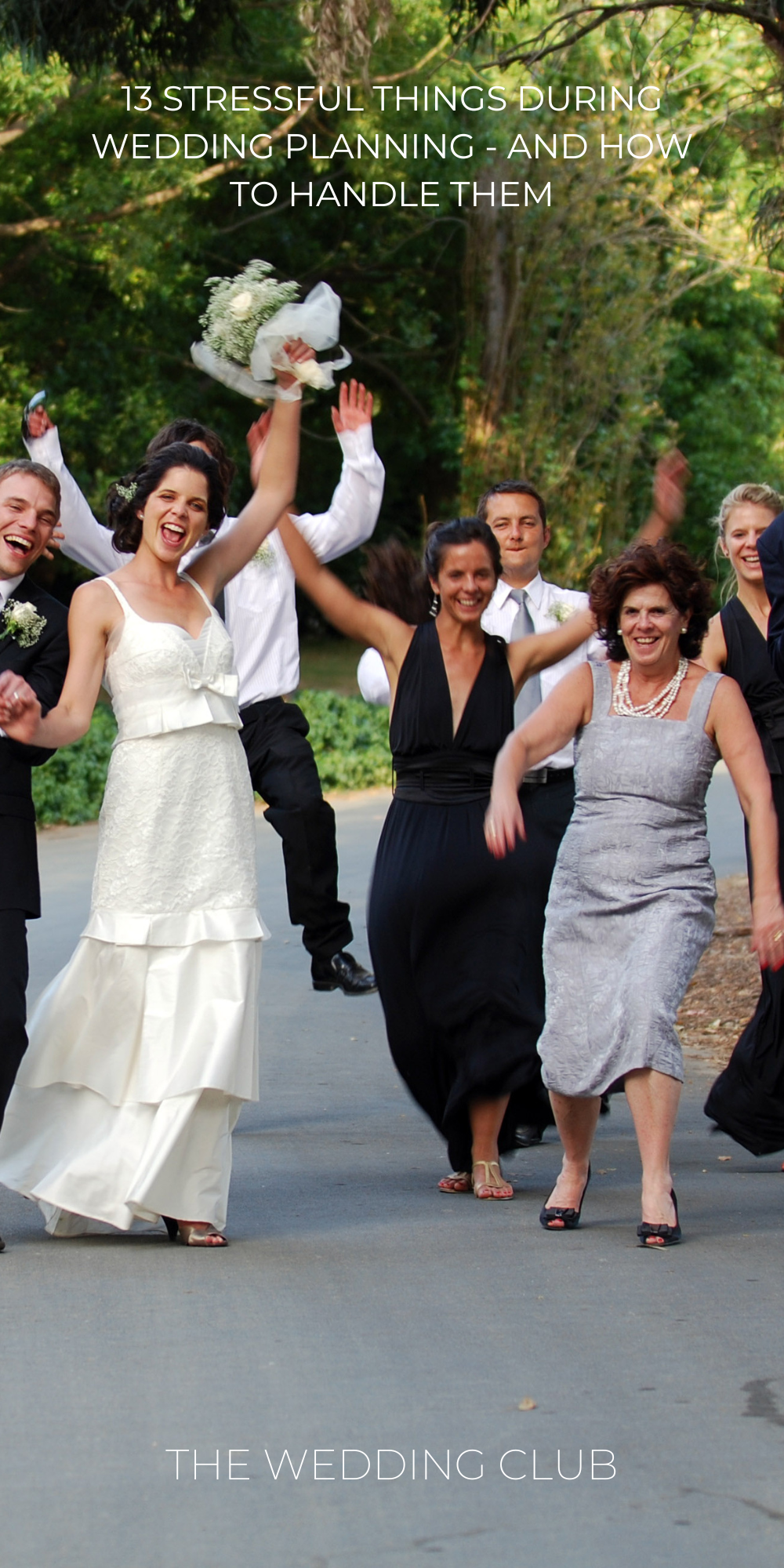
5. Difficulty in choosing the right wedding vendors
Choosing the right wedding vendors can feel like embarking on a never-ending quest to find your very own dream team.
With so many talented professionals out there, it’s no wonder you’re feeling overwhelmed! From photographers to florists, each vendor plays a crucial role in bringing your vision to life.
Finding the perfect match may take time and a little trial and error, but the effort is so worth it. Think of it as assembling your wedding dream team—each vendor contributing their unique talents to create a masterpiece.
So, take a deep breath, trust your instincts, and do your research. Read reviews, ask for recommendations, and, most importantly, go with vendors who genuinely understand and connect with your vision.
Here are some additional tips for finding the right vendors for your wedding:
- Research and compare different vendors: Look at reviews, check out their portfolios, and ask for references.
- Set a budget: Determine how much you can afford to spend on each vendor and stick to it.
- Create a list of must-have services: Make sure the vendors you are considering can provide the services that are important to you.
- Schedule consultations: Meet with vendors in person or via video call to get a better sense of their personalities and how they work.
- Ask for discounts or package deals: Some vendors may offer discounts or package deals for booking multiple services with them.
- Have a backup plan: It’s always a good idea to have a backup vendor in case your first choice is unavailable.
- Trust your gut: Ultimately, choose a vendor that you feel comfortable with and trust to deliver the services you need.

6. Unforeseen problems and setbacks
Ah, the unpredictability of wedding planning! Just when you think you’ve got everything under control, life throws a curveball your way.
Unforeseen problems and setbacks are part of the wedding planning journey, and they can be a real test of your patience and resilience. From unexpected weather changes to last-minute vendor cancellations, it can feel like you’re navigating a maze of challenges.
But here’s the thing—this is where your wedding planning superpowers shine! Embrace the art of adaptability and problem-solving, and remember that setbacks are just opportunities for creative solutions.
With a positive mindset and a little help from your support system, you’ll overcome any obstacle that comes your way.
Here are some tips for handling unforeseen problems and setbacks during your wedding planning process:
Be prepared for the unexpected: No matter how well you plan, there will always be unforeseen problems and setbacks. You need to accept this fact.
Have a contingency plan: Anticipate potential issues and have a plan in place for how to handle them.
Stay flexible: Be open to changing your plans if necessary.
Don’t panic: Stay calm and take a step back to assess the situation before making any decisions.
Communicate with your vendors: Keep your vendors informed of any changes or issues that arise and work with them to find a solution.
Prioritize: Focus on the most important elements of the wedding and let go of the less important details.
Be open to help: Don’t be afraid to ask for help from friends, family, or professionals.
Have a backup plan: Have a backup plan for every detail of the wedding, including the location, date, and vendors.
Stay organized: Keep all of your documents, contracts, and receipts well-organized, so you can refer back to them if needed. Save yourself the trouble and have a wedding binder in place.
Have a positive attitude: Cliché, I know… But, remember that the most important thing is to enjoy your special day, regardless of any setbacks or problems that may occur.

7. Relationship stress
Planning a wedding is like a rollercoaster ride of emotions, and it’s no secret that it can put a strain on even the most rock-solid relationships.
From disagreements on the guest list to differing opinions on decor and everything in between, it’s easy to feel overwhelmed and at odds with your partner.
But here’s the truth—relationship stress is a normal part of the wedding planning process. After all, you’re both pouring your hearts into creating a day that’s meaningful to you both.
The key is communication and compromise. Embrace open and honest conversations, and remember that you’re a team in this journey. It’s okay to have differing viewpoints, but finding common ground and supporting each other’s visions will make your wedding planning experience so much smoother.
Keep the love and laughter at the forefront, and remember that the wedding is just one day—the real prize is the beautiful life you’re building together.
Here are some extra tips for handling relationship stress when planning a wedding together:
- Communicate openly and honestly: Talk to your partner about your feelings, concerns, and expectations.
- Set clear boundaries: Establish what responsibilities each of you will take on and stick to them.
- Take time for yourself: Make sure you both take time to relax, de-stress and do things that you enjoy.
- Seek professional help: If you’re feeling overwhelmed, consider seeking the help of a therapist or counselor.
- Seek support: Surround yourself with supportive friends and family.
- Prioritize your relationship: Remember that the wedding is just one day, but your relationship will last a lifetime.
- Keep the big picture in mind: Try to remember why you’re getting married in the first place and focus on the love and commitment you have for each other.
- Make time for each other: Make sure to schedule regular date nights to spend quality time together.
- Be willing to compromise: Remember that wedding planning is a process that requires compromise and negotiation.
- Seek advice: Ask married couples or those who have recently gone through the wedding planning process for advice on how they managed to maintain a healthy relationship during the process.
8. Difficulty in delegating wedding tasks
Delegating wedding tasks—it sounds easy in theory, but in reality, it can be a challenging feat. As a couple, you want everything to be perfect and reflect your unique vision.
It’s natural to feel hesitant about entrusting certain aspects of the planning process to others. After all, who knows your dream wedding better than you?
Delegating tasks can actually be a blessing in disguise. It allows your loved ones to be part of the journey and take some of the load off your shoulders.
The key is choosing the right people for the right jobs. Trust your closest friends and family to handle specific tasks that align with their strengths and interests. And here’s the best part—delegating creates an opportunity for wonderful bonding moments and shared experiences with your support system.
So relinquish a little control, embrace the power of teamwork, and watch your dream wedding come together beautifully, with love and collaboration at its core.
Here are more tips for delegating wedding tasks:
- Make a list of tasks: Write down all of the tasks that need to be done and divide them into categories.
Assign tasks based on strengths: Consider each person’s strengths and assign tasks that they are best suited for.
Communicate clearly: Make sure everyone understands their responsibilities and the expectations for each task.
Provide guidelines: Give clear instructions on how to complete each task and provide any necessary resources.
Establish deadlines: Set deadlines for each task to ensure that everything is completed on time.
Check in regularly: Follow up with each person to make sure that tasks are being completed as expected.
Show appreciation: Show appreciation for the work that people are doing to help plan your wedding.
Be flexible: Be open to changes and willing to reassign tasks if necessary.
Be specific: Be specific and clear when delegating tasks, to avoid confusion and misunderstandings.
Learn to let go: Trust that others are capable of completing their tasks and allow them the space to do so.
Pro Tip: Instead of simply delegating tasks and trying to manage that in addition to everything else, have some “duties and responsibilities” checklists in place for your bridal party members and hand these out to them to make things easier. In the wedding planner templates for Canva there are prefilled checklists available for the entire wedding party as well as for the emcee.
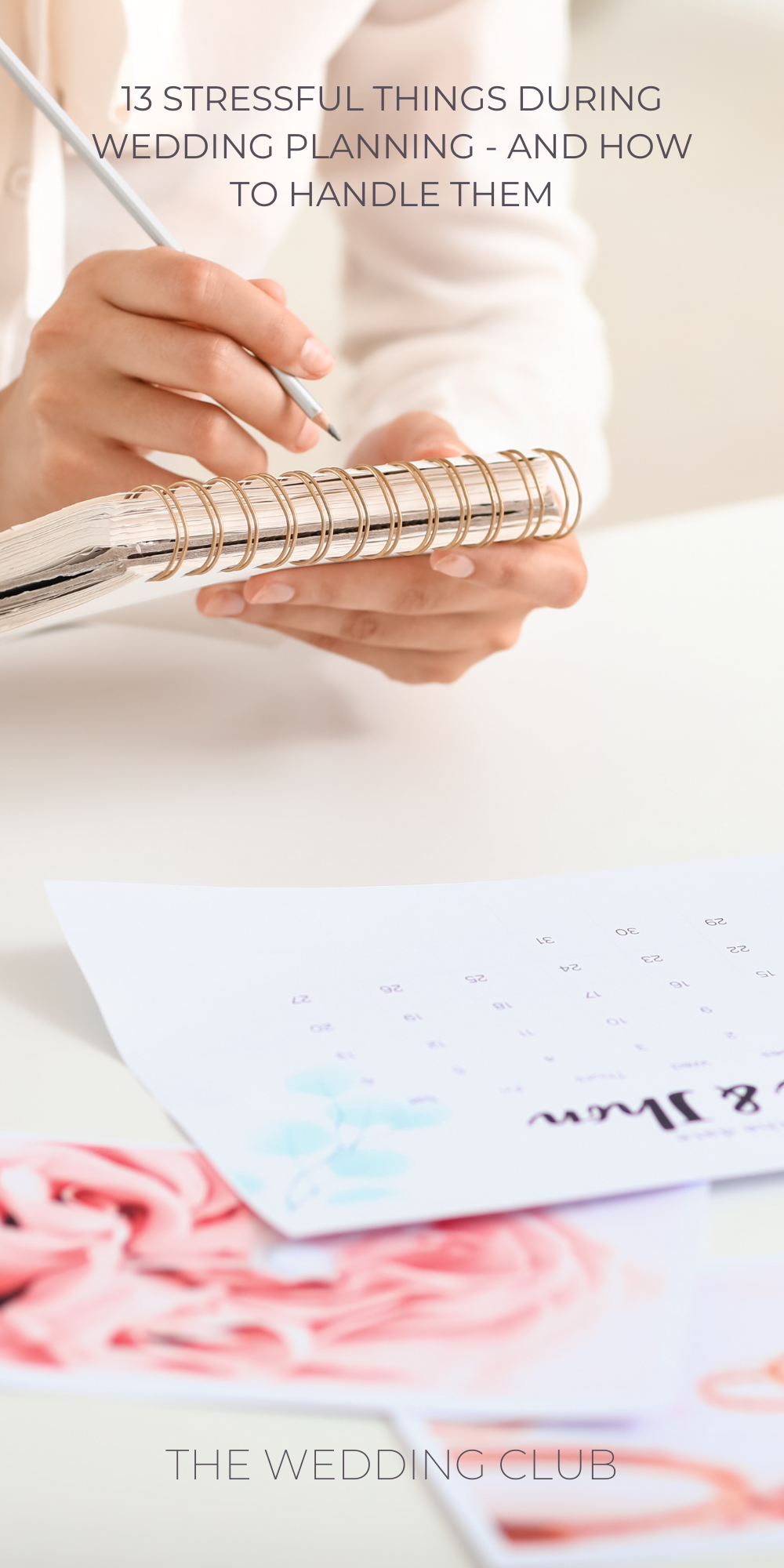
9. Pressure to have a perfect wedding
Ah, the pressure to have a perfect wedding—it’s the elephant in the room that nobody really talks about.
We get it—society, social media, and even well-meaning friends and family can put an immense weight on your shoulders. The expectations are high, and it’s easy to feel like you have to measure up to some impossible standard.
But here’s the truth: perfection is an illusion.
Your wedding day is about so much more than flawless details and picture-perfect moments. It’s about celebrating your love, your journey, and the commitment you’re making to each other.
Embrace the beauty of imperfection and remember that the little hiccups and quirks make your wedding uniquely yours.
Let go of the pressure to please others, and focus on what truly matters: the love between you and your partner. Your wedding day will be perfect in its own imperfectly wonderful way.
Some tips for handling the pressure of having the perfect wedding day:
Set realistic expectations: Understand that a perfect wedding is subjective and what is perfect for one couple may not be perfect for another.
Prioritize what matters most: Determine what elements of the wedding are most important to you and focus on those.
Remember the purpose: Keep in mind that the wedding is about celebrating your love and commitment, not about impressing others.
Don’t compare yourself to others: Each wedding is unique and should be celebrated in its own way, don’t compare your wedding to others.
Seek support: Surround yourself with supportive friends and family who will help you stay focused on what matters most.
Don’t overspend: Stick to your budget and don’t put yourself in financial stress for the sake of having a perfect wedding.
Let go of perfectionism: Understand that it’s impossible to control everything, and that some imperfections make a wedding special and unique.
Be present: Focus on enjoying the process and the special moments of your wedding day, rather than worrying about everything being perfect.
Seek professional help: If you’re feeling overwhelmed, consider seeking the help of a therapist or counselor.
Remember that the wedding is just one day: The most important thing is to enjoy your special day, regardless of any setbacks or problems that may occur.
Also Read: How to make wedding planning fun!

10. Concerns about the future
As you take this monumental step into marriage, questions may swirl in your mind.
Will we be able to handle life’s challenges together? What if things don’t go as planned?
Remember, it’s okay to have these thoughts and feelings. You’re embarking on a new chapter, and it’s completely normal to feel a mix of emotions.
But here’s the thing—what makes a marriage strong is not having all the answers, but having the willingness to face the unknown together. Trust in the love and connection you share with your partner, and know that you’ll navigate life’s journey hand in hand.
Your wedding day marks the beginning of a beautiful adventure—a journey of growth, laughter, and love. Embrace the uncertainty, and remember that the future is brighter when faced together.
Here are some advice for handling uncertainty and concerns about the future:
Talk to your partner: Be open and honest about your worries and feelings about the future with your significant other.
Get some help: If you’re struggling, don’t be afraid to reach out to a therapist or counselor for support.
Keep the big picture in mind: Remember that your wedding day is just one day, but your relationship will last a lifetime.
Make a plan: Work together with your partner to come up with a plan for addressing any concerns you may have about the future.
Don’t be unrealistic: Acknowledge that there may be challenges and obstacles in the future, but don’t let them stress you out too much.
Get advice from others: Ask other couples who have been through the planning process for advice on how they handled their own concerns about the future.
Live in the moment: Enjoy the planning process and try not to worry too much about the future.
Stay positive: Remember that the future is uncertain for everyone, but having a positive attitude can help you get through any challenges.
Lean on your support system: Surround yourself with friends and family who will support and encourage you.
Work as a team: Remember that compromise and teamwork are key in navigating any challenges that may come up in the future.
11. Guest list management
Guest list management—those three words can evoke a mix of emotions for any couple planning a wedding.
It’s like assembling a complex puzzle with pieces that seem to shift and change with each decision. From navigating tricky family dynamics to staying within the venue’s capacity, it’s no wonder this aspect of wedding planning can be incredibly stressful.
It’s okay to feel torn between wanting to invite everyone you know and keeping things intimate. The key is finding the balance that feels right for you.
Remember, your guest list is a reflection of the people who have been a part of your journey and those you want by your side as you say “I do.” Embrace open communication with your partner, set clear boundaries, and don’t be afraid to make tough choices.
At the end of the day, your wedding is about celebrating your love, and the people who truly care for you will understand.
Here are some tips for handling the guest list when planning your wedding:
Set a budget: Determine how many guests you can afford to invite and stick to it.
Make a list of must-invite guests: Make a list of the people you must invite, such as close family members and close friends.
Categorize your guest list: Divide your guest list into categories, such as immediate family, extended family, friends, coworkers, etc.
Set a limit: Decide on a maximum number of guests you can invite and stick to it.
Be honest: Be honest with yourself and your partner about who you really want to invite and who you can afford to invite.
Consider the venue: Consider the size of the venue when creating your guest list and make sure it can accommodate the number of guests you plan to invite.
Be mindful of plus-ones: Be mindful of the number of plus-ones you’re inviting, as they can add up quickly.
Communicate with your parents: If you’re paying for the wedding, have a conversation with your parents about the guest list and try to come to a mutual agreement.
Utilize online tools: Utilize online tools such as wedding websites and apps to manage your guest list, send invites and track RSVPs.
Be decisive: Be decisive when making decisions about your guest list and don’t be afraid to say no to people you don’t want to invite.
Pro Tip: Besides making a gigantic list of people to invite to your wedding, you also need a clear way to manage them, such as their RSVPs, dietary requirements, and if they plan on bringing a plus one. Not to mention, you need to plan out the guest seating for your wedding reception as well, that is why all of these various worksheets are included in the wedding planner templates for Canva – to make things so much easier for you!
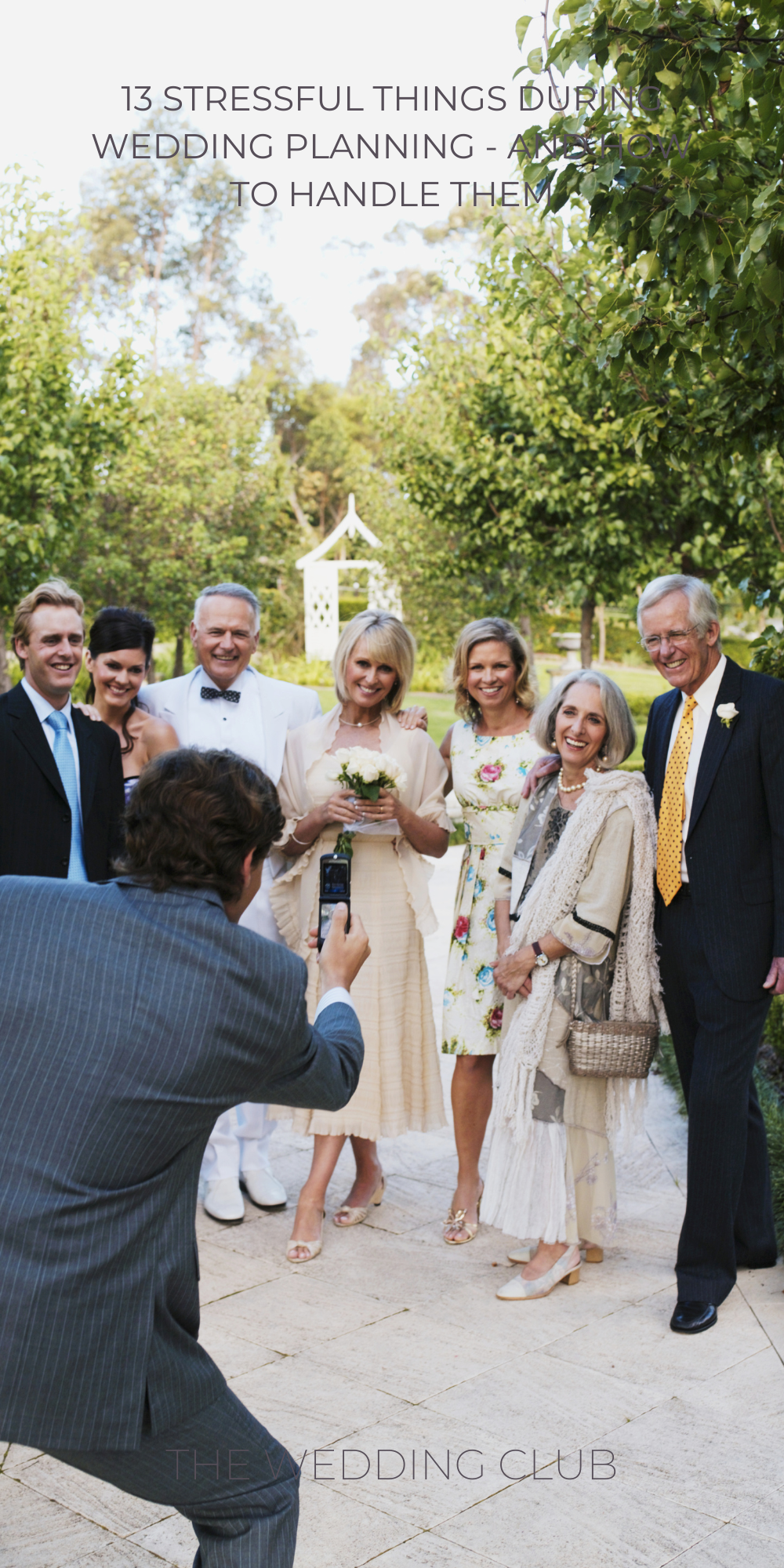
12. Weather concerns
There’s one element that’s completely out of our control—the weather. Rain or shine, it can be a source of stress and anxiety for any couple preparing to say “I do.”
Will it rain on our outdoor ceremony? Will it be too hot for our guests during the outdoor reception? These concerns are entirely valid, but here’s the silver lining—weather worries can’t overshadow the magic of your special day.
Have a backup plan in place, stay flexible, and trust that everything will work out beautifully. After all, a little rain or a burst of sunshine can add its own unique charm to your wedding story.
Here is some advice for handling weather concerns on your big day:
Be prepared: Be prepared for all types of weather by having a backup plan in case of bad weather.
Choose the right venue: Choose a venue that offers indoor and outdoor options in case of bad weather.
Have a rain plan: Have a rain plan in place, such as renting tents or umbrellas, or having the ceremony indoors.
Consider the time of year: Consider the time of year and the likelihood of inclement weather when choosing a wedding date.
Communicate with your vendors: Communicate with your vendors about your weather concerns and make sure they have a plan in place to accommodate them.
Have a contingency plan: Have a contingency plan in place for any last-minute weather changes.
Be flexible: Be flexible and open to changing your plans if necessary.
Have a backup plan: Have a backup plan for every detail of the wedding, including the location, date, and vendors.
Have an optimistic attitude: Remember that the most important thing is to enjoy your special day, regardless of any weather setbacks.
Have emergency kits: Have emergency kits for different types of weather, such as umbrellas, ponchos, sunscreen, bottles of water, etc.

13. DIY projects and crafting
The double-edged sword of wedding planning…
On one hand, it’s a chance to add that personal touch and create unique, heartfelt elements for your big day. On the other hand, it can quickly become a rabbit hole of stress and sleepless nights.
From handcrafting centerpieces to designing invitations, the list of DIY projects can seem never-ending. It’s easy to feel overwhelmed and doubt your crafting skills.
But hey, take a deep breath! DIY projects are meant to be enjoyable, not anxiety-inducing. Set realistic expectations, prioritize what truly matters to you, and don’t take on more than you can handle.
Enlist the help of friends and family for a fun crafting party, and remember that imperfections add character and charm to your creations.
Above all, DIY projects should be a labor of love, not a source of stress. So let’s approach crafting with a sense of joy and creativity, and make your wedding day uniquely and beautifully you!
Here are some tips:
Set realistic expectations: Understand that DIY projects can take longer and be more difficult than expected, so set realistic expectations for yourself. Before you tackle a large amount of items, make one or two and time yourself with a timer. This way, you can work out how long it will take to make a ton of them and decide if it’s something you want to do…
Prioritize: Prioritize which DIY projects are most important to you and focus on those.
Create a schedule: Create a schedule for completing your DIY projects and stick to it.
Seek help: Don’t be afraid to ask friends and family for help with DIY projects.
Be open to help: Be open to delegating some DIY projects to others.
Be open to buying: Be open to buying some items rather than making them yourself. You’ll find out that sometimes it works out way cheaper to just buy the actual thing versus buying the supplies to make it…
Learn to let go: If a DIY project isn’t working out, don’t be afraid to let it go and move on to something else.
Seek professional help: If you’re feeling overwhelmed, consider seeking the help of a professional for some projects.
Take breaks: Take regular breaks to prevent burnout and to give yourself time to recharge.
Stay organized: Keep all of your materials, instructions and deadlines well-organized, so you can refer back to them if needed.
With the right tips and strategies, you can navigate these stressors and make your wedding planning experience a positive one. Remember to set realistic expectations, prioritize, communicate with your partner and vendors, seek professional help if needed, and most importantly, don’t forget the reason why you are getting married in the first place.
Keep in mind that you can always reach out to professionals or other couples who have gone through the wedding planning process for advice and support. With a positive attitude and a little bit of planning, you can make your wedding planning experience a memorable one.
Pro Tip: Yes, planning is both exciting and stressful. But remember: if you have a clear plan in place, it will be so much easier to set the foundation for your wedding planning journey. The wedding planner templates for Canva were specifically created for this purpose and will help you to plan out and manage every aspect of your wedding – from the tiny details and pretty things to the giant tasks of guest list management, delegating duties and handling the wedding budget.
Like this post? Share it by pinning these images to Pinterest!




by Tanya Guilfoyle
Born in Johannesburg, South Africa, Tanya has been an active contributor and planner in the wedding industry since 2016. When not writing useful content for brides and wedding professionals, she can be found designing templates for her Etsy shop, TWCprintables.





